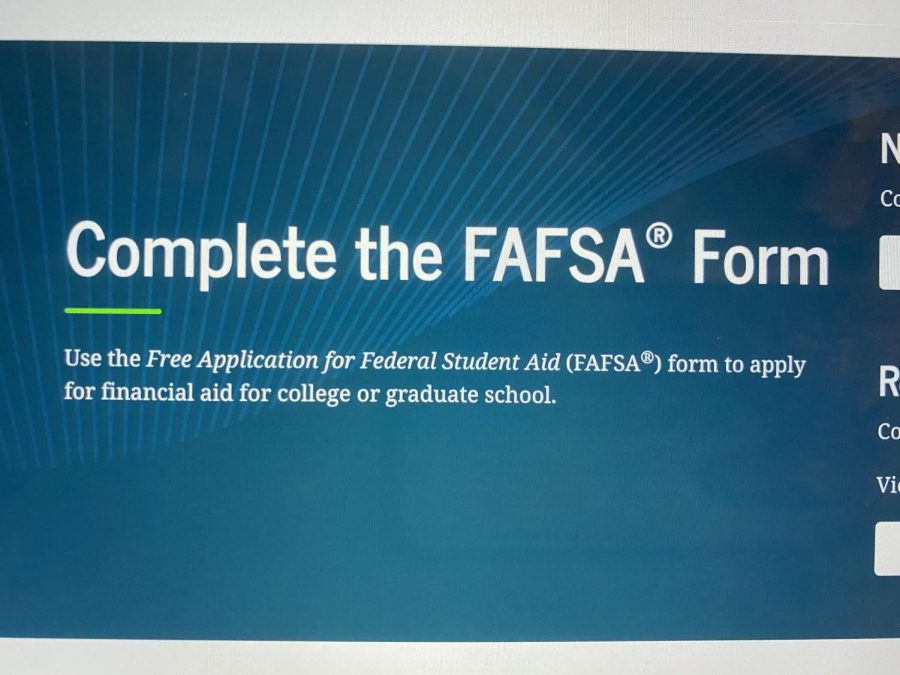FAFSA Requirements
The Free Application for Federal Student Aid, also known as FAFSA is a form used to seek students eligibility for student aid.
April 26, 2021
With graduation approaching closely, the senior class of 2021 now has the option of enrolling for The Free Application for Federal Student Aid (FAFSA). FAFSA is a form filled out by current and eventual college students preceding each year of college to determine one’s federal aid eligibility. After applying and filling out the form, students receive a Student Aid report that describes the extent of financial aid they can be offered. FAFSA is incredibly significant for all students hoping to decrease their tuition cost for higher-level education. Submission of the mentioned form offers federal grants, work-study options, loans, and other benefitting opportunities.
The form analyzes collected personal and financial information to offer financial assistance. For graduating seniors and college students of any age, FAFSA is a godsend and a highly recommended entry to complete. It helps assist low-income households send students off to college with limited tuition costs. Yet with the many benefits offered through FAFSA, there are basic requirements one must possess to apply and qualify.
“FAFSA is an extremely important precedent for college. The scholarships, awards, and funding made possible by the national program can be life-changing to many. While most students have no large issue with tuition costs, people who come from low-income households do, and FAFSA provides opportunities for them. Imagine if a well-performing student could not go to college because it was too expensive.”, states IB sophomore Jiya Bhatt
To apply for FAFSA, there are numerous items one must possess.
If the student is a U.S. citizen and still a minor or dependent on their parents, they will need:
- Social Security card.
- driver’s license (if you have one).
- 2019 W-2 forms.
- 2019 federal income tax return.
- 2019 untaxed income records.
- current bank statements.
- parents’ federal income tax return.
- parents’ 2019 W-2 forms.
- parents’ bank statements.
- parents’ untaxed income records.
- parents’ current business and investment records.
However, if the student is independent and still a U.S. citizen, they will not need any of the parental records.
For other specific information, regarding basic qualifications visit https://www.nerdwallet.com/article/loans/student-loans/fafsa-checklist-documents
The form itself can be intimidating, daunting, and lengthy in determining a student’s future. As a result, a decrease in applications has been seen in the past few years. But it is important to still fill out the form as it determines so much of the financial aspect of college or university.
Bill Wozniak, vice president of marketing for INvestEd, said it appears that two main factors are driving the depression in completion rates this year: a disconnect between schools and students – many of whom are receiving half or more of their instruction remotely this year – and economic pressure from the pandemic causing more families to gravitate away from post-secondary education.
Besides qualified characteristics, certain requirements are needed to apply for FAFSA. First and foremost, one must have satisfactory academic standing or process. For seniors, this depends on GPA or grades in college level classes. For college or undergrad students, FAFSA looks at the degree of academic standing in their major or career path taken. It varies depending on grade or year level. Academic standing also includes the level of engagement of a student in their desired course of high school. Anything from taking an exam, participating in an extracurricular, earning a respectable award, or partaking in an internship counts as engaging in academic aspects. FAFSA takes in the personal, financial, and academic information, analyzes it through a formula to depict the extent of financial aid a student can be offered.
“There is no reason to explicitly not fill out the form for FAFSA. It literally is something made to help students. Privacy is also kept, and personal information is not at risk. So, I definitely recommend taking this form seriously and filling it out, especially current seniors.”, believes IB freshman Ananya Vishwakarma.
For more information on FAFSA, its requirements, or its benefits, please visit https://studentaid.gov/h/understand-aid/how-aid-works




























